County Considers Road Funding Options
Washtenaw County board of commissioners working session (April 17, 2014): For more than two hours, county commissioners discussed the future of the road commission and appeared to reach consensus that no major structural changes will be made at this time.
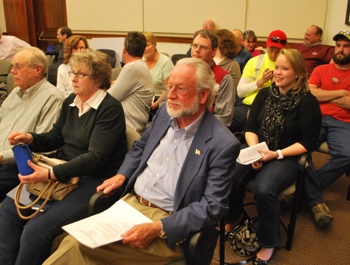
Several Washtenaw County road commission employees attended the county board’s April 17 working session, as did some township officials. In the foreground is Manchester Township supervisor Gene DeRossett. (Photos by the writer.)
More likely, though not yet determined, are efforts to find additional funding sources for road maintenance – including a possible countywide road millage on the Nov. 5, 2014 ballot.
Keeping the road commission unchanged had been the recommendation of a board subcommittee that met for several months to discuss available options, including the possibility of dissolving the road commission and making it part of county operations, rather than operate as an independent entity. Most county commissioners oppose that approach. The board’s May 7 agenda includes a resolution accepting the subcommittee recommendations, which also rejects making the job of road commissioner an elected position. The three road commissioners are currently appointed by the county board.
State legislation enacted in 2012 allowed for: (1) a county board of commissioners to exercise the powers and duties of a road commission; and (2) the functions of a road commission to be transferred to the county board. A sunset clause means that the laws expire on Jan. 1, 2015. That deadline prompted the county board to examine these options.
The board’s May 7 agenda includes a letter to the state House Transportation & Infrastructure Committee, urging passage of HB 5117 and 5118 – bills that would eliminate the current sunset clause and extend the options for changing the road commission functions.
Much of the focus of the April 17 working session was on funding options and long-term strategy for maintaining the county’s road network. Several township representatives who attended the session voiced support for special assessment districts, known as SADs, which are being used in Scio Township to pay for road maintenance.
But Conan Smith, an Ann Arbor Democrat who’s been vocal in urging the county board to take responsibility for the road commission, argued that SADs shouldn’t be a long-term approach. The road network is an asset to the entire county’s economy, he said, and the burden of maintaining it shouldn’t rest on the smaller communities.
Smith also noted that the economy is changing. Telecommuting, for example, might change the way people use the roads, he said. Later in the meeting, road commissioner Barb Fuller noted that other infrastructure needs are important to achieve the vision that Smith had described. “I would suggest that you folks look at making broadband ubiquitous across the county,” she said. For those commissioners who take access to broadband as a given, she said, “trust me – there are parts of the county where they can’t get a signal at all.”
Yousef Rabhi, another Ann Arbor commissioner, also spoke of the need for a broader vision. Roads should serve not just drivers, but also bicyclists and pedestrians. Potholes are a serious safety issue for cyclists, he noted. “We have to keep in mind that not every taxpayer drives a car.”
Regarding funding for roads, Rabhi wanted the discussion to be about the structure of a millage – not whether there should be a new road tax. “I think it’s pretty obvious that we need more money,” he said.
The May 7 agenda includes a discussion item on options for road funding. A draft resolution was circulated at the April 17 working session to put a countywide road millage on the Nov. 5, 2014 ballot. The draft resolution calls for a four-year, 0.5 mill tax – from 2014-2017 – that would raise $7.15 million in its first year. It would earmark 50% of the gross revenues to be used in the municipality in which the revenue was generated. Beyond that, 10% would be used for non-motorized transportation needs – like bike lanes and pedestrian paths – with the remainder to be allocated “based on use, need, and impact to the traveling public.”
Another possibility is for the county board to levy a millage under Act 283. The law allows the county board to levy a millage to cover those costs, without voter approval. A draft resolution that’s been circulated among commissioners calls for levying a 1 mill tax in December 2014, which would generate $14.34 million “to repair 2013–14 winter damage to the roads, streets and paths in Washtenaw County.”
On April 17, commissioners also discussed the possibility of expanding the road commission board from three to five members. That discussion will be continued at a May 8 working session agenda.
For additional background on this process, see Chronicle coverage: “No Major Change Likely for Road Commission” and “Group Explores Road Commission’s Future.“
Public Commentary
Six people spoke during public commentary at the start of the April 17 working session.
Gene DeRossett, Manchester Township supervisor, began by describing attributes of his community. “I think Manchester is the best-kept secret in Washtenaw County,” he said, citing its stock of affordable housing, low tax rate, school system, volunteer fire department and other features. It’s the only school system in the county that provides iPads to all students from kindergarten through 12th grade. He noted that the rural township and village of Manchester don’t have the need for public transportation or a rail system.
Regarding the road commission, DeRossett said he’s worked with the road commission for 40 years in various capacities, including as a former state legislator chairing the transportation committee. The commission has always been solution-oriented, with good public policy, he said. It’s always good to look at how to improve services, especially for all citizens of Washtenaw County. But he couldn’t wrap his arms around why the county board should take more direct oversight of the road commission. He’s talked to a lot of people about it, but not one person has told him it’s a good idea. The road commission is not broken, he said. Road construction and engineering are very complicated, DeRossett said. “I would encourage you to leave the Washtenaw County road commission as it is.” If the county board does decide to expand the road commission board from three to five commissioners, DeRossett suggested that four of them should be based on geographic representation, with the fifth one an at-large commissioner.
There’s a work yard in Manchester Township for the road commission, DeRossett said, and he knows the employees who work there personally. It’s a good working relationship, and he’d hate to lose that. It would be a disservice to the people of Washtenaw County.
Ted Green described himself as a resident of Ann Arbor for about 35 years. He’d done fundraising to help repave Huron River Drive. In 2010 he raised about $45,000. The road commission agreed to double-match that amount so that an additional mile of the road could be repaved, and the county parks & recreation commission kicked in $50,000 to add bike lanes to several sections. After that work was done, there was still a section that needed repaving, Green said. So last year he started fundraising for that and has raised $41,000 so far. He’s also talking to the road commission, which he hopes will again provide a double-match. If this last segment is repaved, then Huron River Drive would have new pavement from Ann Arbor to Dexter, he said.
Green hoped that the county could provide more funding for the road commission. Everyone knows that the state isn’t putting enough money into the roads, he said, “and we don’t really see this improving drastically in the near future.” Because of this, he plans to work toward putting a countywide road millage on the ballot, probably in 2015. He hoped that some members of the county board would support that. He had nothing but praise for the road commission, having worked with them for several years.
Sharon Township supervisor Peter Psarouthakis told the board that the township wants to keep the road commission unchanged. Most of the roads are rural and dirt, which presents some unique issues, he said. He might not agree on everything that the road commission does, but they’re able to work together. His concern is that if the road commission is absorbed into the county, then Sharon Township “might be lost in the crowd.” Psarouthakis said he grew up in Ann Arbor and went to schools in Ann Arbor, and he’s familiar with the city – that’s why he’s concerned. He encouraged county commissioners to visit the township.

Lew Kidder of Scio Township explained how the township’s special assessment districts raise money for road repair.
Lew Kidder of Scio Township introduced himself as an original member of the township’s local roads advisory committee, and its current chair. They’ve been grappling with the issue of deteriorating roads over the last seven years. Everyone agrees that the problem is bad roads, he said, and everyone knows that it takes money to fix the roads. When you strip everything way, the money will come from taxpayers. So the only question is “how does it get from our pockets into the kitty that’s going to fix the bad roads,” Kidder said.
There are five options, Kidder continued. On one end is the U.S. government. Local taxpayers send all funds to the federal government, which then allocates it back for local roads. That’s not the most fiscally responsible approach, he said. The other option is state funding, which is the current approach – with money coming from the gas tax and vehicle registration fees. That’s not working out great, and it doesn’t look like it will improve, Kidder said. And locally, the county doesn’t always get back the amount it puts in, he noted.
So for the vast number of local roads, there needs to be local funding, Kidder said. For that, there are three possibilities: (1) the county; (2) municipalities like townships, villages, and cities; and (3) special assessment districts.
Scio Township is using special assessment districts (SADs) for neighborhood roads, Kidder explained. That’s facilitated by the township in two ways, he noted: an upfront cash grant to get the project started, and a promise that the township will do the road maintenance after the roads are upgraded. In addition, Scio Township has identified certain roads that serve as connectors, and there’s a township-wide special assessment to service those roads. Beyond that, however, there’s a set of roads that the townships can’t effectively deal with, Kidder said, characterizing them as “countywide connectors.” Those include North Territorial, Pleasant Lake, Ann Arbor-Saline, and Pontiac Trail. “In our view, that’s where the county should play a role,” he said.
Kidder urged the board to do three things. One is to be disciplined in their thinking about this issue. Secondly, he hoped they would think comprehensively, and find a system-wide solution. Third, he urged them to not let perfect be the enemy of the good. “Let’s figure out how to start moving toward that goal,” he said.
York Township supervisor John Stanowski noted that he had served on the county board’s road commission subcommittee, and he supported that committee’s recommendation not to dissolve the road commission. He praised the road commission employees, saying they are responsive and helpful. He was afraid that a consolidation would result in chaos and confusion. “What we have works well and efficiently,” he said. “It may not be the best system in the world, but it’s the most effective means for local townships to communicate with the road commissioners and get things done.”
John Posegay, a road commission employee, told commissioners that he’d spoken to the subcommittee and had said that the county board was mostly interested in control. He said that one of the county commissioners, Conan Smith, had denied that the reason for absorbing the road commission was about control. But Posegay contended that most of Smith’s comments during those subcommittee meetings actually “substantiated everything I talked about.” The road commission functions well, Posegay said, and if the county takes it over, it won’t function as well. He also objected to expanding the road commission board to five people, which he didn’t think was a good idea. It’s worked well with three road commissioners for years, he said, and they have never violated the Open Meetings Act to his knowledge. With more road commissioners, “the process slows down a lot,” Posegay said.
Presentation and Background
Andrew DeLeeuw, a graduate student at the University of Michigan Ford School of Public Policy and an intern in the Washtenaw County administration office, gave a briefing about the board’s road commission subcommittee’s work. [.pdf of DeLeeuw's report]
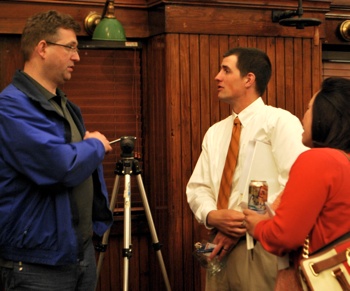
Sharon Township supervisor Peter Psarouthakis, left, talks with Andrew DeLeeuw and county commissioner Alicia Ping (R-District 3), who chaired the county board’s road commission subcommittee. DeLeeuw is an intern with the county administration and a graduate student at the University of Michigan Ford School of Public Policy.
The creation of the subcommittee – at the board’s Oct. 2, 2013 meeting – was prompted by state legislation enacted in 2012 that allowed forj: (1) a county board of commissioners to exercise the powers and duties of a road commission; and (2) the functions of a road commission to be transferred to the county board. A sunset clause means that the laws expire on Jan. 1, 2015, so the Washtenaw County board of commissioners decided to examine these options.
DeLeeuw noted that the Oct. 2 resolution included a $10,000 budget to support the subcommittee’s work, and set a deadline of March 31, 2014 to deliver recommendations to the board.
Members included four county commissioners: Alicia Ping of Saline (R-District 3), Conan Smith of Ann Arbor (D-District 9), Dan Smith of Northfield Township (R-District 2) and Rolland Sizemore Jr. of Ypsilanti Township (D-District 5). Also appointed were three township supervisors: Mandy Grewal of Pittsfield Township, Ken Schwartz of Superior Township and Pat Kelly of Dexter Township. Grewal subsequently withdrew and was replaced by York Township supervisor John Stanowski. Ping served as the subcommittee’s chair.
To date, five counties in Michigan have decided to absorb their road commissions, DeLeeuw said. Those counties are Calhoun, Ingham, Jackson, Macomb and Wayne. At least two counties – Isabella and Ottawa – have debated the issue and decided not to absorb their road commissions.
DeLeeuw’s report notes that the subcommittee received letter from five townships supervisors – in the townships of Ann Arbor, Manchester, Scio, Sharon, Saline – that all supported keeping the current road commission structure. Yousef Rabhi (D-District 8) reported that he recently received a statement from Bridgewater Township supervisor Ron Smith, who said the township board had passed a resolution in support of dissolving the road commission.
In Washtenaw County, there are three road commissioners serving six-year terms: Doug Fuller, Barb Fuller, and Bill McFarlane. Barb Fuller and Bill McFarlane attended the April 17 working session.
The subcommittee met four times, with its last meeting on March 1, 2014. At that meeting, the subcommittee voted to make two recommendations: (1) that the powers and duties of the road commission not be transferred to the county board; and (2) that the county board not consider making the job of road commissioner an elected position. The first recommendation was a 5-1 vote, over dissent from county commissioner Conan Smith of Ann Arbor (D-District 9), who argued that consolidating the road commission into the county would allow for more flexibility and accountability in oversight.
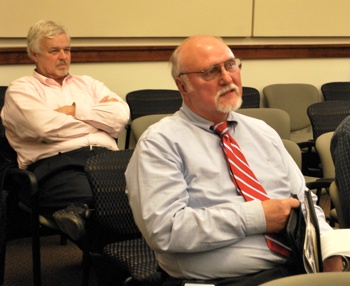
Bill McFarlane, foreground, is a former Superior Township supervisor who now serves as a county road commissioner. In the background is Ken Schwartz, a former road commissioner who was appointed by the Superior Township board of trustees to replace McFarlane as supervisor last year.
After DeLeeuw’s presentation, Bill McFarlane, the newest road commissioner, addressed the board. He’d been appointed at the board’s March 19, 2014 meeting to fill the seat left vacant by the recent death of long-time road commissioner Fred Veigel. McFarlane had previously served as Superior Township’s supervisor for 21 years before retiring in the fall of 2013.
McFarlane said that in his years as supervisor, as well as in his previous job with the sheriff’s department, he’s had a lot of contact with the road commission. It’s always been positive, he said. The current composition of the road commission board is unique, he said. It’s the first time he can recall that the three commissioners are representing the east, central and west parts of the county. His working relationships with the other two road commissioners are very good, he said, and the same is true for road commission employees.
McFarlane said he didn’t know Ron Smith, the supervisor of Bridgewater Township who wants to dissolve the road commission. Smith was probably new, McFarlane added, “because they tend to go through supervisors frequently in that community, for whatever reason.” But for other township supervisors, McFarlane said, they’ve always wanted the road commission to keep its current composition and oversight. He said he doesn’t know of one person, other than Smith, who wants it to change.
Regarding road funding, McFarlane said that the bond issue that Ypsilanti Township has made to pay for roads is working well. Some townships have passed millages for that purpose, he said. Scio Township’s approach of using special assessment districts is being embraced by many other townships, he noted. It seems like a reasonable option to him. McFarlane argued that millages can be unfair to farmers, because their properties are so large, even though they don’t use the roads more than homeowners on small lots. So special assessments seem like the way to go, McFarlane said.
Addressing the possible expansion of the road commission board, McFarlane didn’t see it as a negative or positive, but noted that it’s the county board’s prerogative to do that. He thanked the county commissioners for appointing him.
Board Discussion
The wide-ranging discussion, lasting about two hours, covered four main topics: (1) recommendations of the board’s road commission subcommittee; (2) input on pending state legislation; (3) expanding the road commission board; and (4) options for road funding.
There was considerable overlap, but this report organizes the discussions based on those four issues.
Board Discussion: Subcommittee Recommendations
Felicia Brabec (D-District 4) asked about the subcommittee’s discussion regarding possible expansion of the road commission board from three to five members. Alicia Ping (R-District 3), who chaired the subcommittee, said they hadn’t made a recommendation on that. The consensus was that it was an appropriate discussion for the county board to have, she said, and it wasn’t really part of the subcommittee’s charge.
Dan Smith (R-District 2) elaborated. He also served on the subcommittee, and said the members felt it was more of a political decision that should be made by the elected county board of commissioners. It wasn’t really an operational decision, he said, nor was there a sense that an expansion would result in operational gains.
Brabec also asked for more information about those counties that have made a decision about absorbing the road commission – or not. She wanted to know the rationale for those decisions. Andrew DeLeeuw indicated that the information was available. [.pdf of report with analysis from the counties of Calhoun, Ingham, Jackson and Ottawa.]
Ping replied that some counties consolidated for cost-saving reasons, while other counties were politically motivated. Brabec clarified with Ping that for Washtenaw County, there would be no savings gained by consolidating. [Greg Dill, the county’s infrastructure management director, had done an analysis on overlapping facilities and assets. (.pdf of Dill's report) Diane Heidt, the county’s human resources and labor relations director, had prepared an analysis of any duplications in employee positions at the road commission and the county. (.pdf of Heidt's report)]
Dan Smith elaborated, saying that Ingham and Monroe county officials were drivers of the initial state legislation, so certainly in some communities the decision to consolidate was political. As for himself, Smith said it wasn’t about political reasons or control. Rather, he thought it proper to have a discussion about the possibility of consolidation, given the legislative window, and to decide whether it made sense for Washtenaw County. He noted that as a subcommittee member, he had voted to leave things as they are. To him, these kinds of discussions are “insider baseball,” Smith added. The primary concern for residents is fixing the roads. “To me, that’s really what this is all about.”
Dan Smith said he wasn’t convinced that the county will get any help from Lansing to fix the roads, in terms of funding. “If we really want to take care of the transportation infrastructure in Washtenaw County, we need to take that on and figure out what’s the right thing to do.”
Brabec also wanted to know what the rationale was for recommending not to have the road commissioners as elected positions. Conan Smith (D-District 9) replied. The sense was that elections would be dominated by urban voters who are heavily Democratic, but who would be electing commissioners to oversee road projects in rural communities. So there would likely be a disconnect between the people who govern and those who are responsible for the roads, he said.
Ronnie Peterson (D-District 6) said he was seeing no interest in taking over the road commission or making the road commissioners elected positions. That’s what people are interested in hearing, he said. He hoped to have closure on some of these issues. Although they couldn’t vote at a working session, he noted, they could still arrive at some consensus about these things, “so the public can rest.”
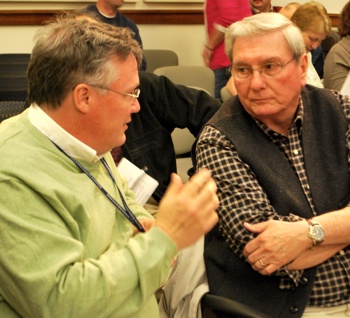
County commissioner Kent Martinez-Kratz, left, talks with Dexter Township supervisor James Drolett before the April 17 working session.
Kent Martinez-Kratz (D-District 1) said he agreed with most of the sentiments he’d heard. His district represents five townships on the west side of Washtenaw County, and most officials from those townships want to maintain the road commission as it is. They have good relationships with the road commission employees, he said.
Yousef Rabhi (D-District 8) praised the current road commissioners, saying he had good working relationships with them. He said he’s talked to a lot of township supervisors, and the general consensus is that everyone likes the road commission as it is.
Rabhi then talked about reframing the issue. The county isn’t in the business of roads, he said. Instead, they should think of it as the business of transportation – getting people from one place to another as efficiently as possible. In the current society, that takes the form of roads, Rabhi said, because most people drive cars. But in the future, that might change. It might be something in the future that’s sustainable – from a financial perspective and an environmental resources perspective.
Rolland Sizemore Jr. (D-District 5), who serves as the county board’s liaison to the road commission, also praised the current road commissioners. He said he was “kind of in the mood for a five-member board,” but basically he liked the current board. His only complaint was with the road commission’s PR, but he knew they were working on that.
Conan Smith said he’s been a big proponent of “what people are calling taking over the road commission.” He wanted to shy away from those words, saying it would be simply a matter of changing the legal status of the road commission. It doesn’t necessarily mean changes to governance or staffing, he said. He’s particularly interested in the change of “ownership” of the road commission, because it might allow the county to do things in the future and create flexibility in a community that’s “actually ahead of the curve on a lot of big problems.” This county thinks critically about problems and designs ways to solve them, he said.
In Michigan, the approach to roads has been a one-size-fits-all solution, C. Smith said, and it might not be the best solution. Other counties that are charter counties – like Wayne and Oakland – have a different structure and can incorporate the road commissions into the county government, he said, and put more money toward roads.
The opportunity that’s in front of Washtenaw County commissioners, C. Smith said, is to design a system of governance that will work optimally to manage the road network. Smith noted that he lives in Ann Arbor, which has a 2 mill street tax and also gets Act 51 funds from the state. If the city wanted to, it would be able to raise even more money for roads, he said. As a larger community, Ann Arbor has more options. That’s not the case for more rural communities, he said.
The county has an interest in maintaining the rural character of its communities, but the current mechanisms for road funding put more burden on those sparsely populated areas, C. Smith said. If it’s important to stop suburban sprawl, then commissioners need to think about what that means in terms of resources for these smaller communities.
The issue of the road commission isn’t a people problem or even a structural problem – aside from perhaps the size of the road commission board, C. Smith continued. With only three members, the possibility of violating Michigan’s Open Meetings Act is inevitable, he said. Though it’s usually accidental, he added, “in a handful of cases, it was intentional.” Smith reported that when Ken Schwartz was road commissioner, Schwartz stood out in the rain waiting to meet with Smith because there’d been another road commissioner talking to Smith about roads. “You should be able to have a casual conversation with one of your colleagues on that board without running afoul of the law,” Smith said.
But adding two more road commissioners is a minor structural change, Smith said. What’s a problem is the current process and system for maintaining the county’s road network. “It’s not putting enough money in the right places at the right time – plain and simple,” he said.
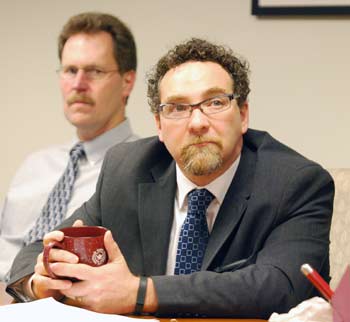
County commissioner Conan Smith of Ann Arbor (D-District 9) at a Jan. 22, 2014 meeting of the county board’s road commission subcommittee. In the background is Roy Townsend, managing director of the road commission.
The county board could vote to put a countywide road tax on the ballot now, C. Smith said. It’s been tried in the past and failed, he added, because there are serious, relevant politics about those decisions, given the current system. For example, Ann Arbor already taxes itself for roads, he said. “Should we tax ourselves more to take care of someone else’s roads? That makes it a very tough vote.” Under the current system, his constituents don’t feel they have a voice in guiding the expenditures of road commission funding. Unless these challenges can be resolved, the county’s road system will continue to deteriorate, he said.
The opportunity to make some of these changes expires at the end of 2014, C. Smith noted. Even if everything else remains the same – the same employees, the same size road commission board – just making the legal change to have the road commission as part of county government would open the door to future problem-solving, he said. That’s the most important step to take in 2014, he added.
Brabec asked what Smith meant by “opening the door” – what changes might result from that?
Right now, C. Smith replied, if the board takes no action, then after 2014 they’ll be locked in to the current system. One way to avoid that is to change the legal ownership of the road commission this year, he said. It’s not a “takeover,” he added, because nothing else would need to change. But it would allow a future county board to make changes, if necessary.
The county doesn’t have enough money to maintain the road infrastructure that currently exists, C. Smith noted. State funding hasn’t kept pace with the rate of inflation, so costs of labor and materials have increased more than available funding. “More money in the system could help a lot,” Smith said. But getting more money in the system would draw out all the other political challenges, he said.
In the past, whenever the board discussed expanding the road commission or putting more money into it, he said, there were questions about the geographic distribution of road commission board members. Right now, there’s probably the best geographic distribution of road commissioners in the past 50 years, he noted. But if all road commissioners are from the east side of the county, for example, then people on the county’s west side might not feel confident that their tax dollars are being spent equitably.
C. Smith also echoed Rabhi’s point that there needs to be a longer-term vision. Just throwing more money at existing roads won’t meet the needs of the county’s future economy. “If anything, your road network is an economic development asset to the county,” Smith said. And the economy is changing.
C. Smith reported that a University of Michigan urban planning professor, Jonathan Levine, makes the case that while wider roads are seen as an efficient way for getting people quickly from Point A to Point B, the most efficient way is to eliminate the need for that trip altogether. “So I see an increase in telecommuting,” Smith said. The dynamic of how the economy functions and how transportation fits into the economy is transforming, he argued, so the community ought to be thinking more deeply about this issue – not simply thinking about how to fix the roads.
Peterson supported exploring these longer-term issues with the road commission. He thought that all county departments should get better at master planning and communicating with each other.
C. Smith replied that it’s possible for the road commission and county board to collaborate on these broader issues, but “I will candidly say that has not always been the case.” The current road commissioners are different than in the past, he said. But the road commissioners, once appointed, are independent and have six-year terms, he noted – three times as long as the two-year terms for county commissioners. So the people who are elected – the county commissioners – lose influence, Smith said. “So is it possible [to collaborate]? Yes. Has our experience proven that it happens? It’s mixed reviews.”
Sizemore said that more collaboration is happening now than in the past. He wasn’t looking for the county board to take control over the road commission.
Peterson suggested working toward annual joint meetings, strategy sessions and goal-setting between the county board and road commission board.
Ping noted that she represents 10 municipalities. She heard from all but two of those communities. Of the eight communities she heard from, only one was in favor of making changes to the road commission. District 3 is the largest geographic district in the county, she said, and a lot of roads are covered by the road commission. Based on feedback she’s received, “my vote would be to not make any changes,” Ping said.
Andy LaBarre (D-District 7) said he didn’t support taking the action to bring the road commission into the county government. Other things need to be in place in order for that to work at this time. He thought that C. Smith’s broader point was critical, that “this system is so broken that it questions the intelligence of anyone who chooses to continue using it. With that said, we’re probably going to continue using it,” LaBarre quipped.
Dan Smith noted that the road commission is set up as a separate entity now. Their structure pre-dates the county board of commissioners, because the road commission was established when there was a board of supervisors. As the name implies, it was composed of all the township supervisors, who are elected to four-year terms. These are some of the historical, structural issues that affect things today.
That said, D. Smith continued, the current road commission board is very different than it was even 15 months ago. He said the three road commissioners are terrific. [Barb Fuller was appointed to the road commission on Oct. 16, 2013 to fill a seat vacated by Ken Schwartz when he took over as supervisor for Superior Township on Oct. 1. The position is for the remainder of a six-year term, through Dec. 31, 2016. This year, former Superior Township supervisor Bill McFarlane was appointed at the county board's March 19, 2014 meeting to fill the seat left vacant by the death of long-time road commissioner Fred Veigel. That term ends Dec. 31, 2014. The third commissioner, Doug Fuller, is serving a term that ends on Dec. 31, 2018. Barb and Doug Fuller are not related.]
LaBarre said it appeared that the board had reached consensus not to take action to absorb the road commission.
Peterson noted that it also seemed there was consensus to accept the recommendation not to make the position of road commission an elected official.
Board Discussion: State Legislation
Regarding the expiration of current legislation that would allow for structural change, Dan Smith told commissioners that he’d drafted a letter to the state House Transportation & Infrastructure Committee, for consideration at the board’s May 7 meeting. [.pdf of letter] The letter supports passage of House Bills 5117 and 5118, which would remove the sunset clause from the legislation.
From the letter:
Washtenaw County’s roads are a critical public asset; stewarding this infrastructure is the responsibility of an independent entity, with negligible input or funding from the elected Board of Commissioners. Eliminating the sunset would provide the board with more options for managing roads, including the possibility of additional locally-generated revenue. We urge passage of HB 5117 and HB 5118.
The letter that’s included in the May 7 agenda is signed by eight of the nine commissioners. Yousef Rabhi (D-District 8) is not listed as one of the signatories.
Board Discussion: Expanding the Road Commission Board
Andy LaBarre wanted to discuss the possibility of expanding the road commission board from three members to five. Even if the road commission isn’t absorbed into the county operations, the county board still has the ability to expand the membership. LaBarre thought that would be a way to avoid the Open Meetings Act issues, and would provide additional voices for constituents in the county. He noted that in the Ann Arbor district that he represents, there are still township “islands” in the city.
He emphasized that the three current road commissioners do a great job.
Felicia Brabec said she’s excited about the diversity of the current road commission, in terms of gender and geography. [Bill McFarlane lives in Superior Township, on the east side of the county. Doug Fuller lives in Dexter, while Barb Fuller lives Sharon Township near Manchester, on the county's southwest side.]
Brabec said she supports increasing the number of road commissioners to five. She requested information about other counties that have expanded their road commission boards in this way. She wanted to know whether it was functioning well in other communities.
Roy Townsend, the road commission’s managing director, reported that 36 counties in Michigan have five road commissioners. Another 42 have three-member road commissions – including Washtenaw County. The remaining five road commissions “aren’t road commissions anymore,” he noted, because they’ve been absorbed into the county government operations. The largest road commission – in Oakland County – still has a three-member board.
Ronnie Peterson wanted to move the discussion of this topic to another night – possibly another working session. There’s interest in expanding, he said, but it would require a longer discussion.
Dan Smith agreed with Peterson, saying that another working session would likely be needed. He noted that expanding to five is the only option in terms of the number of road commissioners allowed. It’s also not possible to constrain those five positions into districts or having at-large members. All of those ideas are great, but unenforceable, he said. It would be possible for the county commissioners to appoint all five road commissioners from the city of Ann Arbor “if that’s what a future board chose to do – and there’s nothing anybody can do about it,” he said.
Yousef Rabhi responded, saying that Smith’s point about enforcement is true. However, he said, the current board can set a policy for itself, and that’s worth discussing. Also worth discussing is how the board handles the appointment process, Rabhi said. “I like the idea of operating with policy,” he said. “And even though it can’t necessarily bind future boards to do something, at least we’ve tried to be deliberate in the actions that we take.”
Generally, Rabhi said, he likes the idea of expanding the road commission board. But he wanted to talk with current road commissioners about it first and get their feedback.
LaBarre agreed to schedule a working session on the topic of road commission expansion. [The topic is now on the agenda for the May 8 working session.] Rabhi pointed out that in past years, the board has scheduled additional working sessions during the year, so that’s another option.
Board Discussion: Road Funding
Yousef Rabhi noted that there are different government entities that have responsibility for maintaining the roads, but “because we live in a democracy, it’s all of our responsibility to maintain the road system – because we all own the roads.” He wanted to discuss Act 283 as a funding option.
By way of brief background, Act 283 requires the road commission to submit a plan of recommended road repairs and the cost to do the projects. The law allows the county board to levy a millage to cover those costs, without voter approval. [.pdf of relevant section from Act 283, including summary by Lew Kidder of Scio Township.] Because the law is more than a century old and pre-dates the state’s Headlee amendment, there’s some uncertainty about the ability of county governments to use it.
Rabhi thought that a millage should serve not just drivers, but also bicyclists and pedestrians. Potholes are a serious safety issue for cyclists, he noted. “We have to keep in mind that not every taxpayer drives a car.”
But regardless of the other road commission issues that need to be addressed, funding is crucial, Rabhi said.
Dan Smith suggested adding the topic of road funding to a future working session.
Conan Smith noted that long-term funding issues are important, but there are also shorter-term needs for road repair. He asked Roy Townsend, the road commission’s managing director, to talk about the effect that this winter’s severe weather has had on roads, and what the increased costs might be.
Townsend told the board that this was a record-setting winter in terms of snow, and in terms of the amount of salt that the road commission used, diesel fuel, and hours logged. It seemed never-ending, he said. Crews were working from 4 a.m. until 8 p.m., then workers would go home for sleep and repeat the cycle.
Typically, the road commission makes about 400 tons of cold patch. This year, they made about 1,400 tons. That’s enough to fill about 300,000 potholes, Townsend said. He characterized it as “300,000 Band-Aids,” and stressed the need for a long-term solution.
Now that spring has arrived, you can see how badly the roads have deteriorated, he said. Even some of the newer roads are showing cracks, because the paving material wasn’t designed for such extreme cold over so long a period. “I’d say we probably lost two or three years of life out of these roads,” Townsend said.
The issue is exacerbated because there hasn’t been the necessary investment in roads in recent years, and in fact there’s been disinvestment, he said. The winter also took a serious toll on the road commission’s equipment. They started out the winter with 53 trucks. There are 46 snow routes. During some of the back-to-back storms, the road commission had fewer than 40 trucks available, because the older trucks break down. This year, they purchased four new trucks. After three months, those trucks had logged over 20,000 miles.
The state legislature has allocated more funding for roads this year as a stop-gap measure, Townsend said. Washtenaw County’s share was about $1.1 million. That will be some help, but not enough. “We’re getting by, but we’re doing less,” he said.
Townsend noted that road commissioners and staff are meeting with officials in all 20 townships to talk about how Scio Township is paying for its roads. If townships take care of smaller local roads, the road commission can focus on primary roads and connectors.
Conan Smith asked Townsend for cost estimates on the impact of this winter, and noted that the severe weather might be the “new normal.” Rabhi said that geothermal roads are one approach that might be considered in future road construction.
Rabhi wanted the discussion to be about the structure of a millage – not whether there should be a millage. “I think it’s pretty obvious that we need more money,” he said. He advocated for setting a public hearing about a possible millage – they could set the hearing at their May 7 meeting, to be held on a future date.
Public Commentary
Three people spoke during public commentary at the end of the working session.
John Posegay, a road commission employee, said that although some of the other ideas that were presented during the discussion were good, the priority should be roads – because roads are a priority for everybody. A few years ago, he said, one of the county commissioners had made a statement about selling a car and using free public transportation. Posegay said if that’s the logic, then the proceeds from selling a car should be put into a pot to help pay for public transportation. Everyone needs to take responsibility for the roads. Nothing is free, he said.
Sharon Township supervisor Peter Psarouthakis spoke again, saying that working with the townships on special assessment districts is an excellent idea. There would be a lot of support for that, he said. If a countywide millage keeps getting slapped down, people can take responsibility for their own areas. This effort doesn’t have to come from the top down, he said. “It can go from the bottom up.” Regarding the board’s plan to send a letter of support for House Bills 5117 and 5118, Psarouthakis encouraged them not to do that. The sunset clause is there for a reason. “I get the sense that there are some political agendas at play here in this room,” he said. Removing the sunset would only encourage more of that.
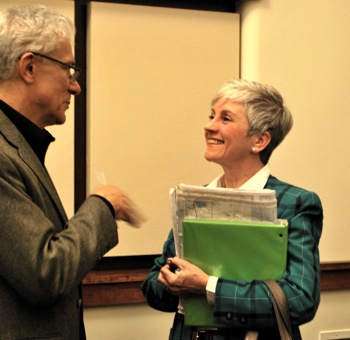
Road commissioner Barb Fuller talks with Victor Dobrin, a candidate in the Democratic primary for the District 5 seat on the Washtenaw County board of commissioners.
Barb Fuller, one of the three road commissioners, made several points in response to the board’s discussion. She noted that there are 20 townships in Washtenaw County, and so far this year the road commission has gone to nine of those townships for annual meetings. Every year, the road commission hears from supervisors, township boards and residents directly, she said, and is paying attention to the problems, the needs, and desires of the local units of government and their citizens. The current geographic distribution of the road commissioners is refreshing, Fuller said, and they take that responsibility very seriously.
Fuller reported that there’s been fairly uniform support and interest from all of the townships about special assessment districts – the approach that Scio Township has taken. They like the idea of putting money from an SAD directly to support roads in that township. “It’s not going somewhere else to be put through the meat grinder and redistributed with some crazy formula, so that when it comes back, nothing happens,” she said. The road commission staff, including Roy Townsend, has been outstanding in working collaboratively and creatively with the townships to find ways to meet their needs, Fuller said.
Funding for roads will need to come from local sources, Fuller said, and the SADs are a viable way to do that.
Regarding Conan Smith’s idea of assuming the duties and responsibilities of the road commission and then delegating them back to the road commission, Fuller said she wasn’t sure that was legally feasible. “I question whether that’s even defensible legally,” she said.
Fuller also responded to Smith’s idea of eliminating trips through telecommuting. “I would suggest that you folks look at making broadband ubiquitous across the county,” she said. Referring to Gene DeRossett’s comment that Manchester schools have provided iPads for their students, Fuller pointed out that some of those kids can’t use them from home because they have no access to the Internet. So for those commissioners who take access to broadband as a given, she said, “trust me – there are parts of the county where they can’t get a signal at all.”
Regardless of whether the sunset clause remains in place or is eliminated, Fuller said there’s a window of opportunity now for more collaboration and long-term planning because of the attitude of people serving on the road commission board and staff. She asked what the county board hoped to achieve by expanding the road commission board to five members. “What is it that’s missing today that that would accomplish?”
The road commission is more than willing to work with the county board, Fuller said. “Give us a chance to address your concerns and please always assume that we’re really willing and ready to work with you. Please don’t assume it in the other direction.”
Responding to public commentary, Conan Smith said that special assessment districts are a good way to overcome a tactical challenge, “but I hope that it is not our long-term solution.” The county has a network of roads that everyone relies on, he said – whether the road is in front of your house and you use it every day, or it’s 10 miles away and you use it occasionally. Even though he doesn’t live in Dexter Township, for example, Smith said he still benefits from a good quality transportation infrastructure there, “and I frankly should have some participatory responsibility to make sure that network is good.”
The SAD approach and the localization of that responsibility is admirable, Smith said, “but it should not be our answer as a society to make it one small community’s problem, or one individual’s problem or one small neighborhood’s problem that our road network is broken. It’s all of our responsibility, and we should find a way that we all together invest in making it well.”
Next Steps
Three items related to the road commission appear on the board’s May 7 agenda: (1) a resolution accepting the recommendations of the board’s road commission subcommittee; (2) a letter to the state House Transportation & Infrastructure Committee, urging passage of HB 5117 and 5118; and (3) a discussion item on options for road funding.
A draft resolution was circulated at the April 17 working session, to put a countywide road millage on the Nov. 5, 2014 ballot. The resolved clauses from that draft resolution state:
NOW THEREFORE BE IT RESOLVED that the Washtenaw County Board of Commissioners for places the following question before the qualified voters of Washtenaw County on the November 5, 2014 ballot:
Shall the millage rate limitation imposed on all taxable property within the County of Washtenaw, Michigan, be increased by 0.5 mills ($0.50 of each $1,000 of taxable valuation) for a period of four (4) years, 2014 through 2017, inclusive, for purposes of providing a fund for the reconstruction, resurfacing, preservation, and related preparation of roads, streets, paths, other transit infrastructure and existing indebtedness thereof in Washtenaw County; and shall the County levy such increase in millage for such purposes, thereby raising in the first year an estimated $7,152,232? This revenue will be managed by the Washtenaw County Board of Commissioners and, as required by law, portions may be subject to capture by tax increment finance authorities in the county.
BE IT FURTHER RESOLVED that 50% of gross revenue generated by this levy shall be earmarked for use in that city, township or village which generated such revenue, less any amounts captured by tax increment finance authorities in that municipality.
BE IT FURTHER RESOLVED that 10% of the revenue remaining after the initial allocations to cities, villages and townships shall be used for non-motorized transportation throughout the county.
BE IT FURTHER RESOLVED that the remaining revenue shall be allocated to projects throughout the county based on use, need, and impact to the traveling public.
Another possibility is for the county board to levy a millage under Act 283. A draft resolution that’s been circulated among commissioners calls for levying a 1 mill tax in December 2014, which would generate $14.34 million “to repair 2013–14 winter damage to the roads, streets and paths in Washtenaw County.”
The resolution also addresses concerns about the potential legal issues related to Act 283. From the draft resolution:
FURTHERMORE, BE IT RESOLVED that Washtenaw County Corporation Counsel is directed to provide an exhaustive formal written opinion, by September 30, 2014, which clearly and convincingly details the exact mechanism under which Act 283 of 1909 taxes may be levied in excess of Article IX, Section 6 constitutional limits without a vote of the people; and that the Washtenaw County Board of Commissioners waives any attorney/client privilege concerning this opinion.
FURTHERMORE, BE IT RESOLVED that the Washtenaw County Board of Commissioners asks the county’s legislative delegation, State Senators Randy Richardville and Rebekah Warren and State Representatives Gretchen Driskell, Jeff Irwin, David Rutledge and Adam Zemke, to request an Attorney General opinion regarding the ability for counties to levy a tax under Act 283 of 1909 in excess of Article IX, Section 6 constitutional limits without a vote of the people.
In addition, the May 8 working session agenda includes the topic of possible expansion of the road commission board.
The May 7 and May 8 meetings both begin at 6:30 p.m. in the boardroom of the county administration building, 220 N. Main St. in Ann Arbor.
The Chronicle could not survive without regular voluntary subscriptions to support our coverage of public bodies like the Washtenaw County board of commissioners. Click this link for details: Subscribe to The Chronicle. And if you’re already supporting us, please encourage your friends, neighbors and colleagues to help support The Chronicle, too!




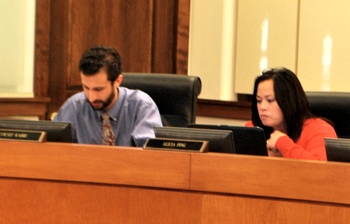
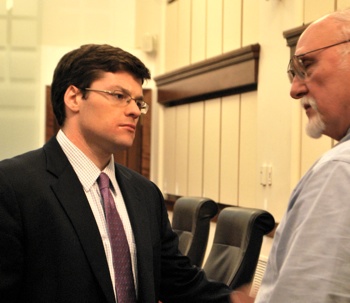
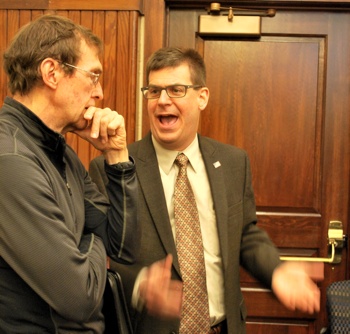
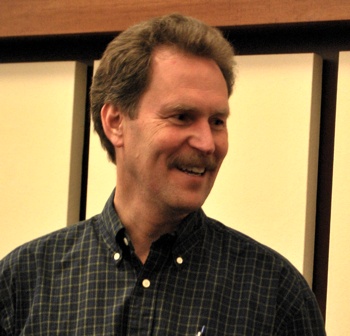
I have been told informally that county commissioners have received legal advice that the Act 283 option is not feasible in this context. I hope that more information will be available during the discussion of road funding options on the May 7 agenda.
I find it remarkable that Ann Arbor and Ypsilanti residents have not been well informed by the media as to the likelihood of a countywide road millage impending this year. (Except, of course, by the Chronicle’s excellent coverage.)